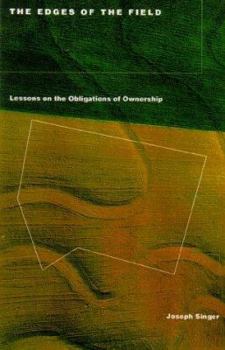The Edges of the Field: Lessons on the Obligations of Ownership
"Startling new answers. . . . Turns the inherently inegalitarian implication of property on its head." -Publishers Weekly (starred review) In The Edges of the Field Harvard law professor Joseph... This description may be from another edition of this product.
Format:Hardcover
Language:English
ISBN:0807004383
ISBN13:9780807004388
Release Date:January 2000
Publisher:Beacon Press (MA)
Length:176 Pages
Weight:0.70 lbs.
Dimensions:0.6" x 5.7" x 8.8"
Customer Reviews
3 ratings
Ethical, Sociological and Religious Look at Legal Deficits
Published by Thriftbooks.com User , 24 years ago
"We can do good and do well at the same time." This book connects together many different perspectives and traditions to assert that now is the time to bring this concept into being through the laws in the United States. Of particular importance are laws governing the duties of business leaders in public companies, the rights of the poor and downtrodden to have an opportunity to develop themselves and live healthy lives, and putting human potential ahead of the treatment of objects. Clearly, this line of thinking requires us to see more interconnectedness among all people and from this time into fuure times. Many young people are attracted to the law as a way to achieve a more just world. Disillusionment sometimes sets in as students begin to appreciate that the law lags behind the development of community ideals. In this interesting volume, Harvard Law School professor Joseph William Singer uses a variety of references to make the case for amending the legal property rights in order to serve all better in the democratic community. Using sources as differing as the efforts to protect workers by the CEO of Malden Mills, the hit musical Rent, Jewish, Christian and Islamic sacred texts, and studies of the effects of new welfare legislation, Professor Singer argues persuasively for releasing many citizens from "duties" in the law that only serve to create harm in practice.There is a comforting view of the potential to be humane in this book that will make any reader glad to think about the potential to be a noble person in serving all. Those who do not know about the legendary hospitality of Abraham will enjoy the part of the book that explains the impetus to serve others that is recounted in the Torah (and the Old Testament). The book's title refers to the Jewish law that fields should be cultivated to the edges, and that the gleanings from those edges be left for the poor (along with any grain that falls to the ground and any sheaves that are left behind). From this observance evolves the familiar and broader moral perspective that those who have, also have the need to share and assist others. We are all guardians for all. At a time when individualism and materialism are strong, and community is becoming weaker, it is all the more important to consider the roots of what methods have always served the needs of humanity well. These analogies and our subjective reaction to them can help us understand where we need to rebalance our focus. If we can extend our vision to think about all the ramifications of our actions, we will take more meaningful actions that will bring us greater spiritual and material comfort. Done properly, the outcome will also be more prosperity for all, including those who give.In what you do every day, how could what your organization does be changed to benefit more people and more kinds of people in more ways?May you also find wonderful ways to expand health, happiness, peace, and prosperity for all!
Joe SInger has written a wonderful book
Published by Thriftbooks.com User , 24 years ago
Joe Singer has written a wonderful book. In contrapuntal style, he addresses many of the contradictions of the "prosperity" of modern capitalism. This gives the book an even handed feel which makes the most disagreeable truths easier to confront. He illumines the gaps between the law and human values in the context of corporate dynamics. The title delightfully prepares the reader for an excursion into the history and the development of religious acommodation to the inequality of men. Again and again, this book answers questions that have been at the edge of one's consciousness - why is corporate conduct apt to be threatening to human welfare? Why are people like Aaron Fuerstein so rare ? Where is the failure ? What should we be doing about it? Above all else, this is a fair book. Its seemingly simplicity makes the reader appreciate its jewel like qualities.
A thoughtful and insightful look at the value of values
Published by Thriftbooks.com User , 24 years ago
This deceptively simple and accessible book brings together complex arguments to a conclusion that unites the heart, mind, and spirit -- ownership has obligations as well as rights, and acting with a sense of mercy and fairness is not only ethical and right, but economically beneficial as well. Singer compellingly tells the story of Malden Mills, whose CEO kept the employees on the payroll after the factory burned down -- because it was the right thing to do. Tying together sources from the Old Testament to the Broadway show, "Rent," Singer makes an important contribution to our notions of property and our own conduct. The title, a reference to the Biblical injunction to leave the wheat from the edges of the field for the poor to glean, also reminds us of field theory in physics, the interconnectedness of everything, magnificently described in this fine and important book.





